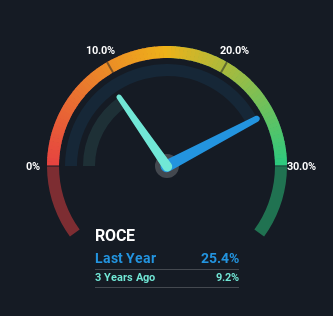- United States
- /
- Hospitality
- /
- NasdaqGS:PZZA
Many Would Be Envious Of Papa John's International's (NASDAQ:PZZA) Excellent Returns On Capital

If we want to find a stock that could multiply over the long term, what are the underlying trends we should look for? Ideally, a business will show two trends; firstly a growing return on capital employed (ROCE) and secondly, an increasing amount of capital employed. If you see this, it typically means it's a company with a great business model and plenty of profitable reinvestment opportunities. With that in mind, the ROCE of Papa John's International (NASDAQ:PZZA) looks attractive right now, so lets see what the trend of returns can tell us.
Return On Capital Employed (ROCE): What Is It?
For those that aren't sure what ROCE is, it measures the amount of pre-tax profits a company can generate from the capital employed in its business. The formula for this calculation on Papa John's International is:
Return on Capital Employed = Earnings Before Interest and Tax (EBIT) ÷ (Total Assets - Current Liabilities)
0.25 = US$146m ÷ (US$874m - US$297m) (Based on the trailing twelve months to June 2023).
So, Papa John's International has an ROCE of 25%. That's a fantastic return and not only that, it outpaces the average of 9.6% earned by companies in a similar industry.
View our latest analysis for Papa John's International

In the above chart we have measured Papa John's International's prior ROCE against its prior performance, but the future is arguably more important. If you'd like, you can check out the forecasts from the analysts covering Papa John's International here for free.
What The Trend Of ROCE Can Tell Us
In terms of Papa John's International's history of ROCE, it's quite impressive. Over the past five years, ROCE has remained relatively flat at around 25% and the business has deployed 40% more capital into its operations. Returns like this are the envy of most businesses and given it has repeatedly reinvested at these rates, that's even better. If Papa John's International can keep this up, we'd be very optimistic about its future.
The Bottom Line
In short, we'd argue Papa John's International has the makings of a multi-bagger since its been able to compound its capital at very profitable rates of return. And given the stock has only risen 40% over the last five years, we'd suspect the market is beginning to recognize these trends. That's why it could be worth your time looking into this stock further to discover if it has more traits of a multi-bagger.
One more thing to note, we've identified 1 warning sign with Papa John's International and understanding this should be part of your investment process.
If you'd like to see other companies earning high returns, check out our free list of companies earning high returns with solid balance sheets here.
New: Manage All Your Stock Portfolios in One Place
We've created the ultimate portfolio companion for stock investors, and it's free.
• Connect an unlimited number of Portfolios and see your total in one currency
• Be alerted to new Warning Signs or Risks via email or mobile
• Track the Fair Value of your stocks
Have feedback on this article? Concerned about the content? Get in touch with us directly. Alternatively, email editorial-team (at) simplywallst.com.
This article by Simply Wall St is general in nature. We provide commentary based on historical data and analyst forecasts only using an unbiased methodology and our articles are not intended to be financial advice. It does not constitute a recommendation to buy or sell any stock, and does not take account of your objectives, or your financial situation. We aim to bring you long-term focused analysis driven by fundamental data. Note that our analysis may not factor in the latest price-sensitive company announcements or qualitative material. Simply Wall St has no position in any stocks mentioned.
About NasdaqGS:PZZA
Papa John's International
Operates and franchises pizza delivery and carryout restaurants under the Papa Johns trademark in the United States, Canada, and internationally.
Average dividend payer and fair value.
Similar Companies
Market Insights
Community Narratives



